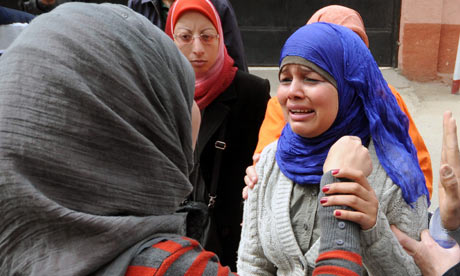"I insist on getting my rights and will not leave it, no matter the cost. The future of Egyptian women is in danger," she told the Guardian. The reason for this, Ibrahim believes, is that in post-revolution Egypt there are two powerful forces that stand to hinder the progress of women's rights. "Now the Egyptian woman is violated from two sides, one is the military and the other are the Islamists," she said.
It wasn't supposed to be like this. After the ousting of Mubarak in February 2011 there was a strident hope that things would change for the better for all Egyptians, including women. Things took a turn for the worse when a women's march in Tahrir to commemorate International Women's Day was attacked. Ibrahim was arrested the following day along with 20 other women and taken that night to a military prison where they were tasered and strip-searched before the seven unmarried women were subjected to the test.
Ibrahim has paid a heavy price for being the first to speak out and become the representative of the victims of the sexual assault. "I sacrificed my job and now my reputation and the Egyptian media has forsaken me, there was some support before and now that is gone. There's no one standing by me and that is a catastrophe," she said.
"These violations have always occurred against us [Egyptian women] and many people are frustrated and depressed because of the verdict yesterday," she added.
What is strange about the verdict is that several members of the ruling military junta, the Supreme Council of the Armed Forces (Scaf) have already admitted that the tests did happen, justifying it with the rather bizarre notion that it was done to avoid allegations of rape against military soldiers.
Ibrahim is philosophical about the verdict however, stating that it was "preferable to him getting a reduced sentence because had they given him six months or a year it would be a catastrophe, so I see the verdict in my favour because now it is my right to resort to international law."
And even though she was visibly distraught after the verdict was read out she feels that it wasn't going to be any other way. "What happened is the biggest proof of the corruption of Egyptian law, especially military law because Egyptian law lets me down every time. I'm not expecting anything under military rule because the military – and especially Scaf – will never indict itself."
It seems the next recourse is international law, with Egyptian human rights groups releasing a statement on Monday that they will be pursuing the case in the international arena, firstly with the African Commission on Human and People's Rights, a semi-judicial body that is weighing cases brought against the Egyptian government by local human rights groups.
Ibrahim confirmed this, saying, "I've decided to file an international lawsuit and it is my right as a citizen since my rights are lost here even though many military commanders admitted this happened and now they're denying it."

